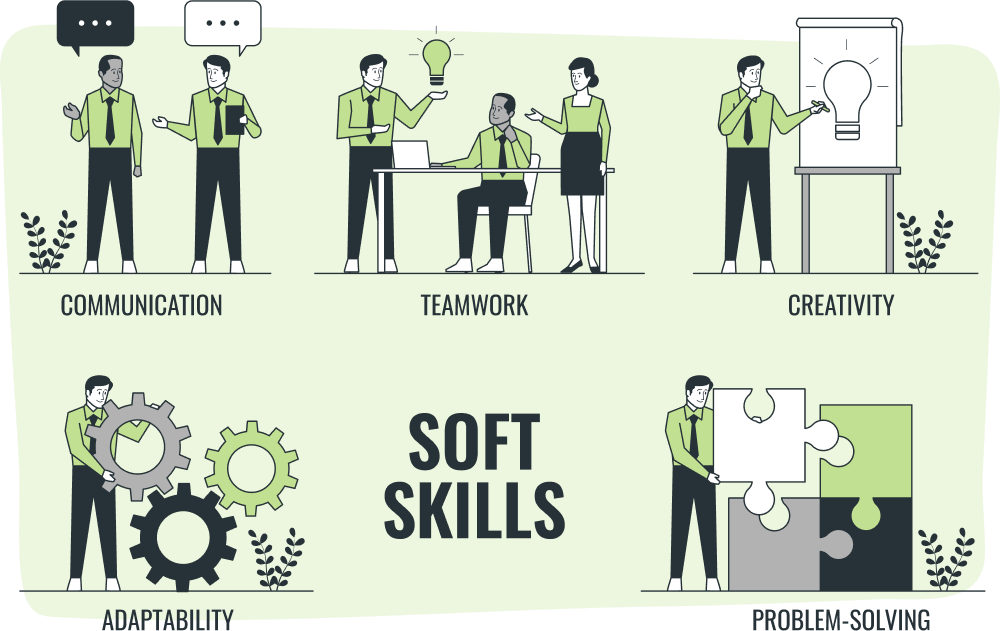10 essential soft skills in 2024 and how to develop them

In 2024, soft skills continue to play a crucial role in professional and personal success, across the globe. These skills, which include communication, emotional intelligence, and adaptability, are essential for steering the complexities of the modern workplace. As technology advances and industries evolve, the ability to effectively interact, empathise, and adapt becomes even more valuable.
Inviting you to the blog, where we will explore the ten essential soft skills for 2024, their demand in the current job market, and learn actionable strategies for developing each one.
What are soft skills?
Soft skills are non-technical skills that relate to how you interact with others, solve problems, and manage your work. They include communication, teamwork, and emotional intelligence.
10 essential soft skills in 2024
- Emotional Intelligence (EQ)
- Adaptability
- Critical Thinking
- Communication
- Teamwork and Collaboration
- Time Management
- Creativity
- Networking
- Leadership
- Problem-Solving
1. Emotional Intelligence (EQ)
Emotional Intelligence (EQ) is highly sought after in the job market. A study by TalentSmart found that EQ is responsible for 58% of job performance across various types of jobs. Furthermore, 90% of top performers possess high EQ, making it a crucial skill for leadership and team dynamics.
Examples
- Empathy Exercises: Practising active listening in team meetings to understand colleagues’ perspectives.
- Stress Management: Using mindfulness techniques to maintain composure during high-pressure situations.
- Conflict Resolution: Applying EQ to mediate and resolve conflicts within teams effectively.
How to develop emotional intelligence skill
- Mindfulness Meditation: Regular practice can improve emotional regulation and empathy.
- Journaling: Reflecting on your emotional responses and interactions daily helps enhance self-awareness.
- Feedback: Seek feedback on your emotional responses and work on areas needing improvement.
2. Adaptability
Adaptability is critical in the modern job market, especially as technology and business practices evolve rapidly. IBM’s 2010 Global CEO Study highlighted adaptability as a key factor for business success, and the Harvard Business Review reports that adaptable employees are 6.7 times more likely to outperform their peers.
Examples
- Cross-Training: Learning different roles within your organisation to become versatile.
- Taking on New Projects: Volunteering for projects outside your comfort zone to build new skills.
- Embracing Change: Proactively seeking opportunities to improve processes and adapt to new technologies.
How to develop adaptability skill
- Exposure Therapy: Gradually expose yourself to new and challenging situations to build resilience.
- Feedback Loop: Actively seek feedback and use it to adjust and improve your approach to tasks.
- Continuous Learning: Regularly update your skills through courses and workshops.
3. Critical Thinking

Critical thinking is essential for effective problem-solving and decision-making. The World Economic Forum lists critical thinking as one of the top skills needed by 2025, reflecting its importance in the workplace.
Examples
- Case Studies: Analysing real-world scenarios to improve problem-solving skills.
- Socratic Questioning: Using Socratic questioning regularly can help uncover deeper insights, challenge assumptions, and lead to more meaningful conversations. It is a method of disciplined questioning used to explore complex ideas, get to the truth, open up issues and problems, and uncover assumptions. Named after the Greek philosopher Socrates, this technique helps develop critical thinking and reflective dialogue.
- Debate Clubs: Engaging in structured debates to enhance logical reasoning and argumentation skills.
How to develop critical thinking skills
- Socratic Questioning: Regularly practise this technique to probe the underlying assumptions and evidence of your beliefs.
- Problem-Solving Exercises: Participate in activities like puzzles or strategy games to sharpen your analytical skills.
- Continuous Education: Enrol in courses that focus on logic, reasoning, and critical thinking.
4. Communication
Effective communication is a fundamental skill in any job. Google’s Project Oxygen identified communication as one of the top qualities of effective managers, and a LinkedIn survey found that 57% of business leaders prioritise soft skills like communication over hard skills.
Examples
- Public Speaking: Regular practice through clubs like Toastmasters can significantly improve verbal communication.
- Writing Workshops: Attending workshops to refine your written communication skills.
- Nonviolent Communication (NVC): Learning and practising NVC techniques to enhance clarity and empathy in interactions.
How to develop communication skills
- Toastmasters: Join this international club to practise public speaking and improve verbal communication.
- Feedback: Seek constructive feedback on your communication style and adjust accordingly.
- Active Listening: Practise active listening to ensure you understand others before responding.
5. Teamwork and Collaboration

Collaboration and teamwork are essential in modern workplaces. A Stanford study showed that teams collaborating in problem-solving activities perform better and are more innovative than individuals working alone. McKinsey & Company also reported that collaborative teams are five times more likely to be high-performing.
Examples
- Agile Methodologies: Participate in Agile or Scrum teams to learn collaborative project management.
- Team Sports: Engage in team sports to build cooperation and trust.
- Collaborative Software: Use tools like Slack, Trello, or Asana to manage and track collaborative efforts effectively.
How to develop teamwork and collaboration skills
- Team Projects: Participate in group projects to practise and enhance your teamwork skills.
- Active Listening: Encourage input from all team members and practise active listening.
- Conflict Resolution: Develop conflict resolution skills to handle disagreements constructively.
6. Time Management
Effective time management increases productivity and reduces stress. According to the Harvard Business Review, it is a critical skill for achieving success in both personal and professional life. The American Psychological Association also found that effective time management leads to better work-life balance and lower stress levels.
Examples
- Pomodoro Technique: The Pomodoro Technique is a time management method developed by Francesco Cirillo, breaking work into 25-minute focused intervals (“Pomodoros”) separated by 5-minute breaks. After four Pomodoros, take a longer break of 15-30 minutes.
- Eisenhower Matrix: Applying this tool to prioritise tasks based on urgency and importance.
- Time-Tracking Apps: Utilising apps like Toggl or RescueTime to monitor and optimise how you spend your time.
How to develop time management skills
- Pomodoro Technique: Adopt this time management method to enhance focus and productivity.
- Prioritisation: Use tools like the Eisenhower Matrix to prioritise tasks effectively.
- Continuous Monitoring: Regularly review and adjust your time management strategies using time-tracking apps.
7. Creativity
Creativity is a highly valued skill in the workplace. The Adobe Creativity Study (2014) found that companies encouraging creativity outperform their peers in revenue growth. Additionally, IBM’s CEO Study revealed that 60% of CEOs cited creativity as the most important leadership quality.
- Design Thinking Workshops: Participate in workshops to learn structured creative problem-solving methods.
- Divergent Thinking Exercises: Engage in brainstorming sessions and use techniques like SCAMPER (Substitute, Combine, Adapt, Modify, Put to another use, Eliminate, Reverse).
- Regular Breaks: Schedule regular breaks and downtime to foster mental recovery and creative thinking.
How to develop creativity skills
- Design Thinking: Enrol in workshops to learn and practise this method.
- Creative Exercises: Regularly engage in activities that challenge your thinking, such as brainstorming and mind mapping.
- Diverse Experiences: Seek new experiences and perspectives to inspire creative thinking.
8. Networking
Networking is crucial for career advancement. LinkedIn research shows that 85% of jobs are filled through networking, and Harvard Business School found that people with strong networks are more successful and earn higher salaries.
Examples
- Professional Associations: Join relevant associations and attend their events to meet industry peers.
- Mentorship Programs: Participate as both a mentor and mentee to build and expand your network.
- Networking Platforms: Use LinkedIn to its full potential by engaging in groups, sharing content, and connecting with thought leaders.
How to develop networking skills
- Professional Associations: Join and actively participate in industry associations.
- Mentorship: Seek out mentorship opportunities to grow your network.
- Social Media: Leverage platforms like LinkedIn to connect with professionals and engage in industry discussions.
9. Leadership

Effective leadership is essential for organisational success. Gallup’s State of the American Manager Report links effective leadership to higher employee engagement and productivity. Deloitte’s Global Human Capital Trends also identifies leadership as a top priority.
Examples
- 360-Degree Feedback: Used by companies like GE and Deloitte to develop effective leaders. This is a comprehensive performance evaluation method where an employee receives feedback from multiple sources, including peers, subordinates, supervisors, and sometimes clients. This holistic approach helps individuals gain a well-rounded perspective on their performance, strengths, and areas for improvement.
- Leadership Training Programs: Enrol in programs offered by institutions like Harvard Business School or Dale Carnegie Training.
- Situational Leadership Theory: Study and apply this theory to adapt your leadership style to the needs of your team.
How to develop leadership skills
- Leadership Training: Participate in formal leadership development programs.
- 360-Degree Feedback: Implement this system to gain comprehensive insights into your leadership impact.
- Mentorship: Seek guidance from experienced leaders to refine your leadership skills.
10. Problem-Solving
Problem-solving skills are critical in navigating complex business challenges. McKinsey Quarterly emphasises the importance of problem-solving in the digital age, and the World Economic Forum lists complex problem-solving as a top skill for 2025.
Examples
- Root Cause Analysis: Learning and applying techniques like the 5 Whys or Fishbone Diagram to identify underlying issues.
- Lean Six Sigma Training: Getting certified in Lean Six Sigma to improve process efficiency and problem-solving skills.
- Hackathons: Facebook and Google use hackathons to encourage innovative problem-solving among employees. Participating in hackathons to practise rapid problem-solving in a collaborative environment.
How to develop problem-solving skills
- Root Cause Analysis: Regularly practise this method to improve your problem-solving abilities.
- Lean Six Sigma: Enrol in certification programs to enhance your skills.
- Hackathons: Participate in hackathons to challenge and develop your problem-solving skills in real-time scenarios.
Conclusion
By investing in these competencies, you are not only enhancing your employability and performance but also fostering better relationships and a more fulfilling life. Embrace the challenge, commit to growth, and you will watch these soft skills open new doors to you to opportunities and enrich your life in 2024 and beyond.
FAQ
Why are soft skills important in 2024?
Soft skills are crucial in 2024 because they enable individuals to navigate the complexities of modern workplaces, adapt to changes, and build strong relationships.
How can I develop my communication skills?
You can develop communication skills by practising active listening, engaging in public speaking, and improving your non-verbal communication.
What is emotional intelligence, and why is it important?
Emotional intelligence is the ability to understand and manage your emotions and the emotions of others. It is important because it enhances interpersonal relationships, decision-making, and stress management.
What techniques can improve my problem-solving skills?
Improving problem-solving skills involves practising brainstorming techniques, enhancing analytical thinking, and tackling real-world problems. Seeking feedback and reflecting on your solutions also contribute to improvement.
What are the skills trend in 2024?
The skills trend in 2024 includes Emotional Intelligence, Adaptability, Critical Thinking, Communication, Teamwork, Time Management, Creativity, Networking, Leadership, and Problem-Solving.
What are the top 5 skills in 2024?
The top 5 skills in 2024 are Emotional Intelligence, Adaptability, Critical Thinking, Communication, and Teamwork
What are the top 10 soft skills?
The top ten soft skills are Emotional Intelligence, Adaptability, Critical Thinking, Communication, Teamwork, Time Management, Creativity, Networking, Leadership, and Problem-Solving.
How to improve soft skills?
Improve soft skills by seeking feedback, practising active listening, participating in workshops, engaging in teamwork activities, setting personal development goals, and reading relevant literature.
Which skill will be most required by 2025?
Emotional Intelligence will be most required by 2025, as it is crucial for effective interpersonal interactions and leadership.
What is the best thing to learn in 2024?
The best thing to learn in 2024 is Emotional Intelligence, as it enhances interpersonal relationships and leadership abilities.
What is the most needed skill in 2030?
The most needed skill in 2030 is Critical Thinking, essential for navigating complex problems and making informed decisions.
Which skill is best for freelancing in 2024?
The best skill for freelancing in 2024 is Communication, as it is key to effectively managing client relationships and delivering services.
What is the most demanding job in 2024?
The most demanding job in 2024 is Data Scientist, due to the growing importance of data-driven decision-making across industries.
Which technology is in demand in 2024?
Artificial Intelligence (AI) technology is in high demand in 2024, driving innovation and efficiency in various sectors.
Which skill is best for the future?
The best skill for the future is Adaptability, as it enables individuals to thrive in rapidly changing environments.
Which skill makes the most money?
Leadership skills make the most money, as effective leaders drive organisational success and are often highly compensated.
















